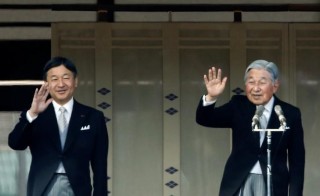Search
▼ Businesses Await Japan's New Era Name as Emperor's Abdication Looms
- Category:Other
TOKYO — Companies that produce calendars and diaries are keeping close tabs on government debate about the likely upcoming change in Japanese era name, which is linked to the reigning emperor, as they prepare to put to market new era-correct products.
Following Emperor Akihito’s video message released last August expressing his desire to relinquish the chrysanthemum throne due to his advanced age, the companies are eager to know how far in advance the new era name will be announced before it actually comes into effect.
“I felt a bit concerned when I watched his majesty’s video message because I thought it could affect production of this year’s diaries,” said Azusa Miyakoshi who works in the development division of Takahashi Shoten Co, a major textbook and calendar maker.
In Japan, an era name, known as “gengo,” remains in use for the length of an emperor’s reign, with the current era under Emperor Akihito called Heisei. Calendars and official documents often designate years by era name with or without reference to the Gregorian date.
Usually, calendars and diaries for the upcoming year start hitting stores in September, with planning and production starting in January, so producers need to be made aware of an era change so they can make stock on time.
Calendar makers will also likely be forced to change the Emperor’s Birthday national holiday to reflect the new emperor’s date of birth while the current Dec 23 holiday may be renamed something else.
“It’ll be too late if (an era name change) is announced six months beforehand,” said Miyakoshi. “We want the announcement to be made as soon as possible.”
Prime Minister Shinzo Abe’s government is reportedly seeking to enact special legislation during the current Diet session through June 18 to enable the 83-year-old emperor to abdicate.
Currently, only posthumous succession is effectively allowed as the 1947 Imperial House Law that sets out rules for imperial affairs lacks a provision regarding abdication.
Although the timing of the abdication has not been formally decided, the government anticipates the emperor will step down in late 2018, given his remarks in the video message, which said “in two years we will be welcoming the 30th year of Heisei,” meaning 2018.
Changes in Japanese era names have affected people’s lives in various ways, including in the filing of administrative papers and official documents such as driver’s licenses and health insurance cards.
The selection of names for newborn babies may be also affected by the new era name.
Shortly after the nation’s era name changed from Meiji to Taisho in 1912, following Emperor Meiji’s death, names inspired by the new era name, such as those containing the Chinese character used, became the most common new names for newborn babies, according to Meiji Yasuda Life Insurance Co., which compiles an annual ranking of the most popular baby names.
“In recent years, people have tended to care more about selecting names based on how they look and sound. Depending on the meaning of Chinese characters used in new era name and how it sounds, it could be used for babies’ names,” said Sho Tanaka, a spokesman from Meiji Yasuda.
Meanwhile, programmers seem to be ready for a change in era name as most companies and public organizations have already modified their IT systems to enable the new era name to be displayed.
“Even if a new era name is announced abruptly, we will be able to quickly update programming to reflect it,” said an official from the Japan Information Technology Services Industry Association.
© KYODO
- February 13, 2017
- Comment (0)
- Trackback(0)


